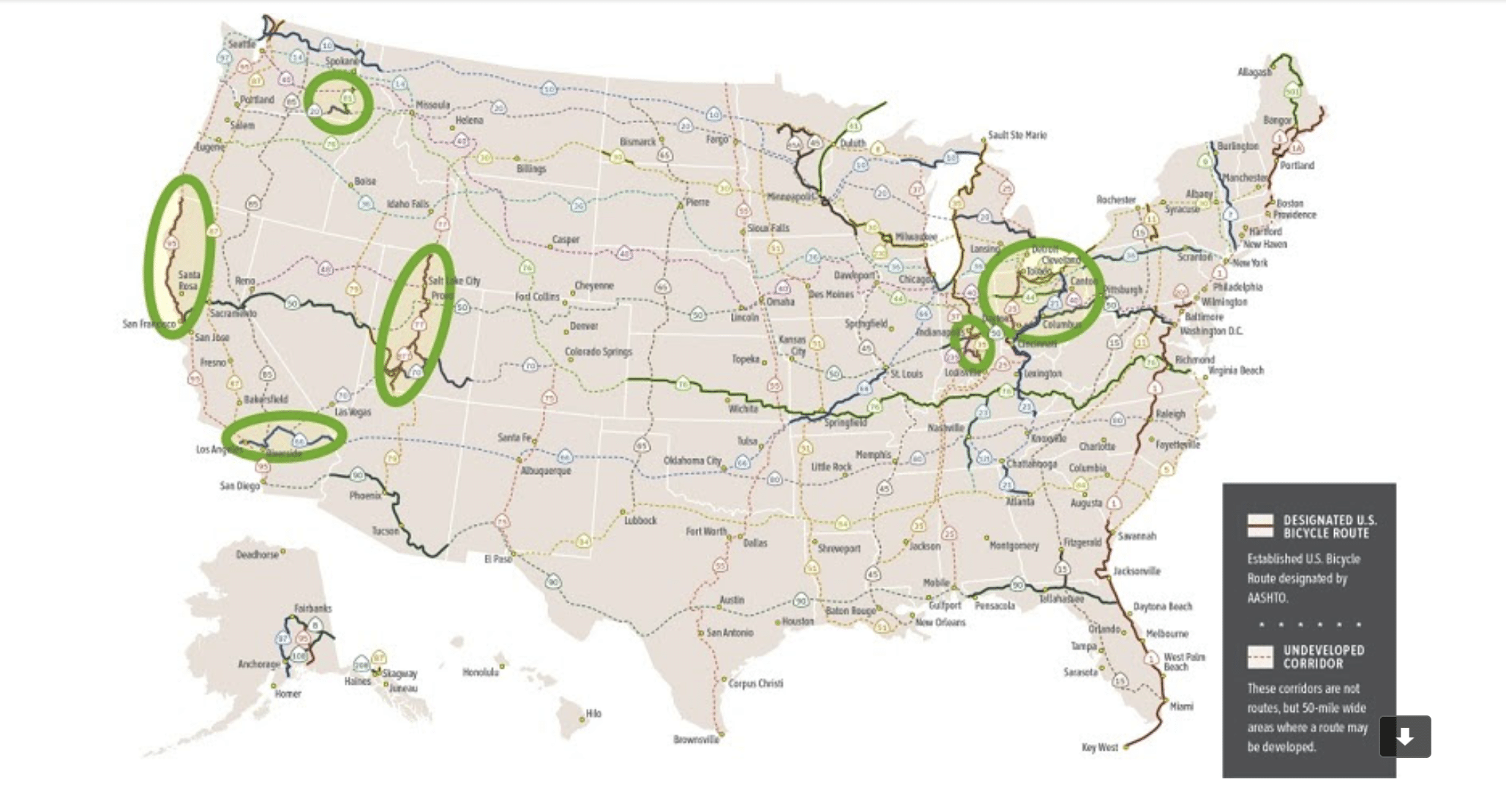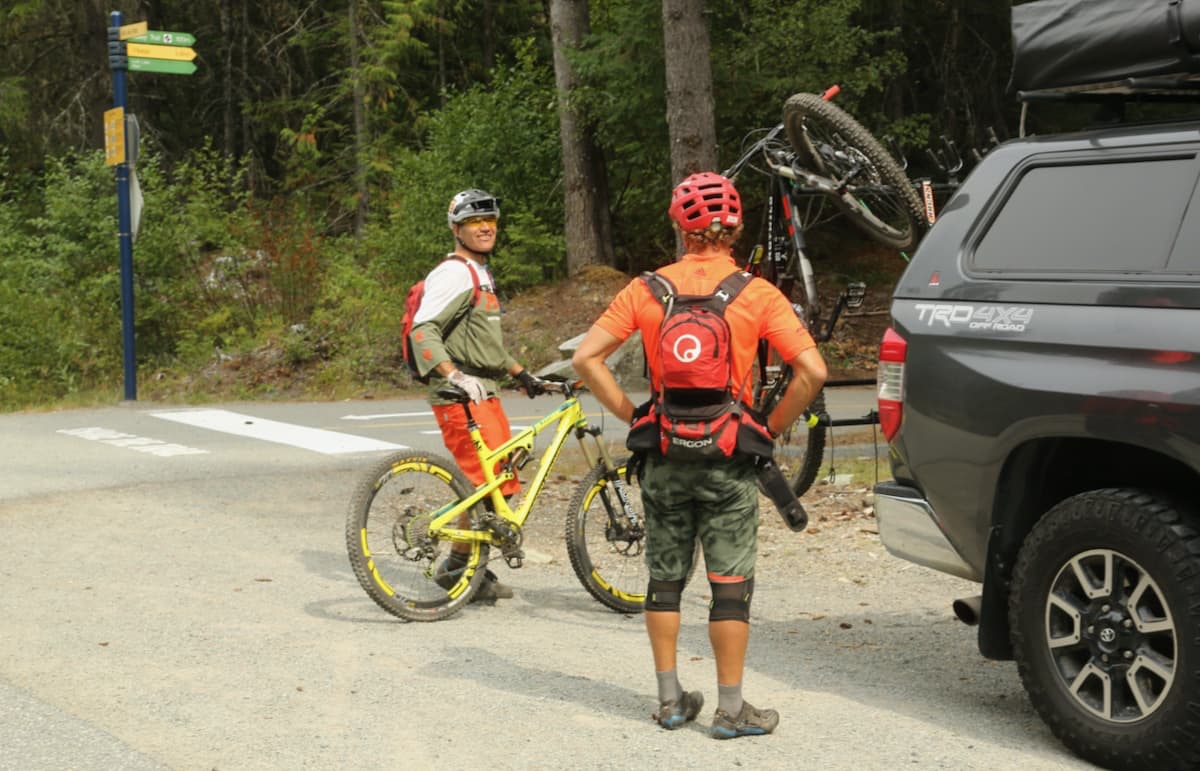
With the new designations, the USBRS now boasts 17,734 miles of routes in 31 states and Washington, DC. At least 40 states are currently developing U.S. Bicycle Routes.
Adventure Cycling Association is proud to announce the designation of 18 new U.S. Bicycle Routes in five states, adding 2,903 miles to the U.S. Bicycle Route System (USBRS). The new routes in California, Indiana, Ohio, Utah, and Washington State represent the largest addition to the USBRS to date in terms of both the number of designations and their total mileage. Two other routes in California and Florida also have been realigned to improve the cycling experience.
The new routes offer a variety of scenic cycling opportunities from the Midwest to the Northwest and the Southwest. In California, follow the Pacific Coast from Oregon to San Francisco or across the state from the high desert to Los Angeles. In Indiana, ride from Indianapolis to Bloomington and beyond. In Ohio, connect Cleveland, Toledo, Cincinnati, and more. In Utah, go from the foot of the Wasatch Front to Salt Lake City and the painted cliffs and pinnacles near the Arizona border. And in Washington State, ride the rolling Palouse and into the Snake River Canyon.
“Twice each year, state departments of transportation play a significant role in the expansion of the U.S. Bicycle Route System by designating new routes. This summer, we are not only witnessing the highest number of designations in any single period to date, but we are also seeing why making improvements to existing routes when possible is important. In Northern California, for example, officials realigned U.S. Bicycle Route 50 to take advantage of a new paved path that is making cycling in the region safer and better than ever before.”
– Jim Tymon, Executive Director of the American Association of State Highway and Transportation Officials (AASHTO)
With the new designations, the USBRS now boasts 17,734 miles of routes in 31 states and Washington, DC. At least 40 states are currently developing U.S. Bicycle Routes.
Digital maps for all designated U.S. Bicycle Routes are available to the public for free on the Adventure Cycling Association website.
Adventure Cycling Association, a nonprofit organization that provides national coordination for the USBRS, partners with AASHTO to ensure states have the resources and expertise needed for successful route designation.
“With this addition of nearly 3,000 miles, the U.S. Bicycle Route System continues to pick up momentum — and the growth of the system benefits every person who has, is, or will be traveling by bike. Adventure Cycling Association applauds our state department of transportation partners, who understand the role bike travel plays in our national infrastructure, supporting health and wellness, transforming communities, and increasing economic activity across the country.”
– Scott Pankratz, Executive Director of Adventure Cycling

Highlights of the newly designated USBRS routes include:
California:
USBR 66 (329.8 miles): Where possible, USBR 66 generally follows the historic U.S. Route 66. Beginning at the Arizona border, the route crosses the Colorado River then travels along the high-desert National Trails Highway, passes through Barstow, Victorville, and San Bernardino, follows the Pacific Electric Bikeway across the eastern end of the San Gabriel Valley, and reaches Los Angeles, where highlights include Olivera Street, Chinatown, Hollywood, and Beverly Hills, before it ends on the pier at Santa Monica.
USBR 95 (440.4 miles): USBR 95 begins at the Oregon border and mostly follows U.S. Highway 101 and the Pacific Coast to San Francisco. After passing through Crescent City, the route travels under the shade of redwoods through Eureka, reaches Mendocino, climbs and descends coastal headlands, rides over the Russian River, continues on to Sausalito, crosses the Golden Gate Bridge, and finishes on the southern edge of San Francisco.
USBR 50: In El Dorado County, USBR 50 has been realigned to take advantage of a newly completed segment of the El Dorado Trail.
Florida:
USBR 1: In Key West, USBR 1 was realigned to allow safer passage to the southernmost point in Florida.
Indiana:
USBR 235 (122.1 miles): USBR 235 is a scenic alternative to USBR 35 between Indianapolis and Seymour. From Monument Circle in downtown Indianapolis, the route passes the Indiana State Capitol and joins the White River Trail at White River State Park, opens up into farmland, turns to hills near Martinsville, takes a spur out to bike-friendly Bloomington, returns to Lake Lemon, and ends in Seymour.
Ohio:
USBR 21 (366.9 miles): Starting at Edgewater Park in Cleveland, USBR 21 follows the Ohio to Erie Trail through Akron, Massillon, and Columbus to Cincinnati, then continues along the Ohio River to Aberdeen, with nearly three-quarters of the route on off-street trails.
USBR 25 and USBR 225 (308.2 and 2.3 miles): USBR 25 starts at the Michigan border and passes through Toledo, Lima, and Dayton along segments of the Great Miami River Trail, reaches Cincinnati, and continues along the Ohio River to Aberdeen. USBR 225 is an alternate route through Piqua along the opposite bank of the Great Miami River.
USBR 30 and USBR 230 (225.6 and 78.1 miles): USBR 30 travels from Ohio’s border with Pennsylvania to its border with Michigan. The route starts near Ashtabula, and passes through Cleveland and Toledo, following the shore of Lake Erie and the North Coast Inland Trail. USBR 230 is a scenic alternative that continues along the shore of Lake Erie from west of Cleveland through Lorain and Sandusky before rejoining USBR 30.
USBR 44 (196.1 miles): USBR 44 follows the Ohio to Erie Trail out of Massillon, crosses Charles Mill Lake on the way into Mansfield, passes through Bucyrus and outside Lima, and reaches its end at the Indiana border.
For more info, check out: Ohio Department of Transportation State & US Bike Route System
Utah:
USBR 77, USBR 677, and USBR 877 (349.8, 40.6, and 88.8 miles): USBR 77 begins at the Idaho border and travels through Logan, along the Wasatch Front from Ogden to Salt Lake City and Provo, then climbs between the mountains of the Fishlake National Forest, and continues on to its end at USBR 70 in Torrey, near Capitol Reef National Park. USBR 677 is a less urban and more scenic alternate route on the west side of Utah Lake, while USBR 877 connects USBR 77 in Sigurd to USBR 79 in Panguitch.
USBR 79 and USBR 679 (269.3 and 9.4 miles): From the Nevada border, USBR 79 crosses high desert, reaches Cedar City, climbs toward the painted cliffs and pinnacles of Cedar Breaks National Monument, passes Panguitch, then descends to its end at the Arizona border, in the Navajo sandstone near Kanab. USBR 679 connects USBR 79 at U.S. Highway 89 and USBR 70 at Duck Creek Village.
Washington:
USBR 81 and USBR 281 (103.4 and 23.1 miles): USBR 81 rolls through the wheat fields of the Palouse, staying close to the border with Idaho. Starting near the town of Tekoa, the route passes Pullman, home of Washington State University, then descends into the Snake River Canyon to Clarkston, and continues on to Asotin. USBR 281 is an alternate route from Pullman across the southern extent of the Palouse atop the Columbia Plateau, connecting with Idaho north of Clarkston.
USBR 40 (1.9 miles): USBR 40 is a small start to a route that will eventually stretch 400 miles across Washington. It currently starts at the Idaho border and ends in Tekoa.
USBR 20 (77.8 miles): USBR 20 begins at the Idaho border in Clarkston and crosses the Columbia Plateau. The route follows the Snake River past the island that makes up Chief Timothy Park, climbs through rolling hills to Alpowa Summit, descends Pataha Creek to Pomeroy, then climbs and descends again to Dayton, and reaches Lewis & Clark State Park on the Touchet River before its end.
About Adventure Cycling Association:
Adventure Cycling Association inspires, empowers, and connects people to travel by bicycle. It is the largest cycling membership organization in North America with more than 50,000 members. Adventure Cycling has produced over 50,000 miles of meticulously mapped cycling routes for North America, organizes more than 100 tours annually, and publishes bicycle travel information including Adventure Cyclist magazine. Adventure Cycling Association has provided dedicated staff support to the U.S. Bicycle Route System since 2005, including research support, meeting coordination, and technical guidance for states implementing routes. Phone: 800-755-BIKE (2453). Web: www.adventurecycling.org.